About Library and Information Service Directorate
The Library and Information Services, as one of the academic units of the University, believes that the bright future of the institution can be realized when the Library and Information services is led by comprehensive long and short-term plans. To this end, the Library has designed this three years strategic plan.
On the same stride, all these expansions of library buildings in HU are a means to address the current highest ever student enrollment and to make available adequate space both for brining collections and ICT Infrastructure In short, it is means to achieve the ultimate mission of the university by solving the existing space problem and by accommodating future needs of the library and its users.
Director
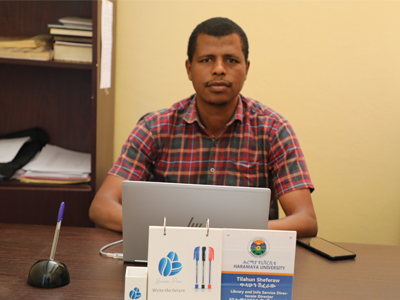
Tilahun Shiferaw (Assist. Professor)
Director for Library and Information Services Directorate
Contact Detail
Mobile Number: +251928073582
Office Number: +25125
Email Address: tilahun.shiferaw@gmail.com
Visit our Libraries Capacity
Available Library branches with their hosting capacities at a time
No | Name of the Library | Number of seats |
1 | Main Library | 2759 |
2 | School of Graduate Students Library | 514 |
3 | Female Students Library | 946 |
4 | College of Law and Social Sciences Library | 916 |
5 | Haramaya Institute of Technology Library | 714 |
6 | Haramaya Institute of Technology Library (New) | 325 |
7 | Veterinary Medicine Library | 714 |
8 | Veterinary Medicine Library (New) | 250 |
9 | Sport Science Academy (New) | 250 |
10 | Harar Campus Library | 1014 |
11 | Harar Campus SGS Library | 702 |
The library of Haramaya University acquires books, journals, magazines, electronic materials, and other documents required for teaching and research through procurement, open access, and donations. The library also provides Internet services for both graduate and undergraduate students. The below figure is our digital library access laboratory which mainly essitabilished for undergraduate students

We have our own servers for managing our electronic services.
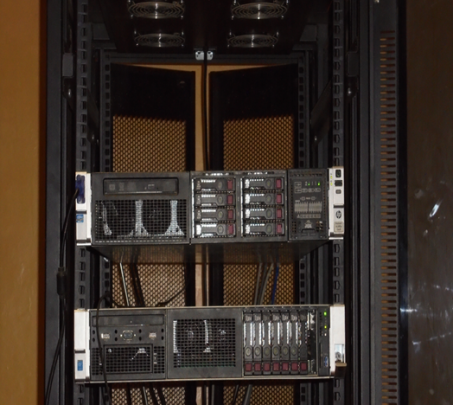
In order to make accessible our resources, all our library branches are fully connected with broadband and wireless internet. Our students can get access to our digital collections from any of the libraries.
No | Name of computer Laboratory | Computers available |
1 | Main Library Females Computer Lab with broadband connection | 43 |
2 | Main Library Basement with Virtual Digital Infrastructure (VDI) | 205 |
3 | SGS Library Computer Lab with broadband connection | 80 |
4 | Law and Social Sciences computer laboratory | 30 |
5 | Female Students Library Computer Lab with broadband connection | 25 |
6 | Technology Library with Virtual Digital Infrastructure (VDI) Lab 1 | 150 |
7 | Technology library Computer Lab2 with broadband connection | 20 |
8 | Harar Campus SGS Library Computer Lab with broadband connection | 40 |
HU Digital Library Systems
HU Digital Library System: Access url Address (http://dl.haramaya.edu.et)
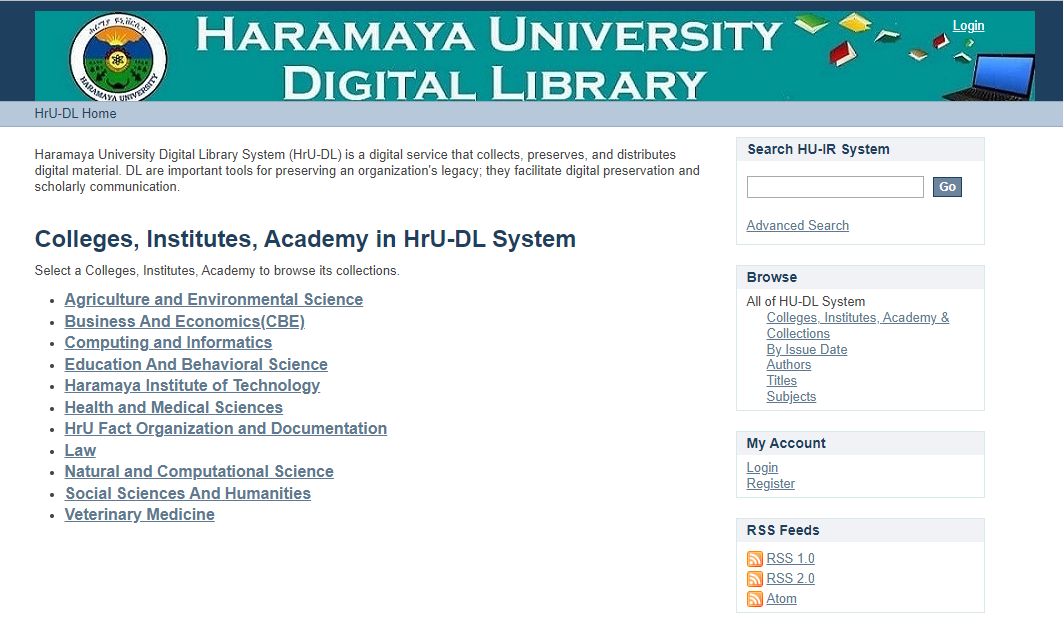
Haramaya University Library & Information Services is embedding new technology into library services. Our digital library offers digital reference books in real-time via the web. Students and staffs of the university can have access to the stored digital collections online via the internet for teaching, learning, and research.
HU Institutional Repository System: Access url Address (http://ir.haramaya.edu.et)
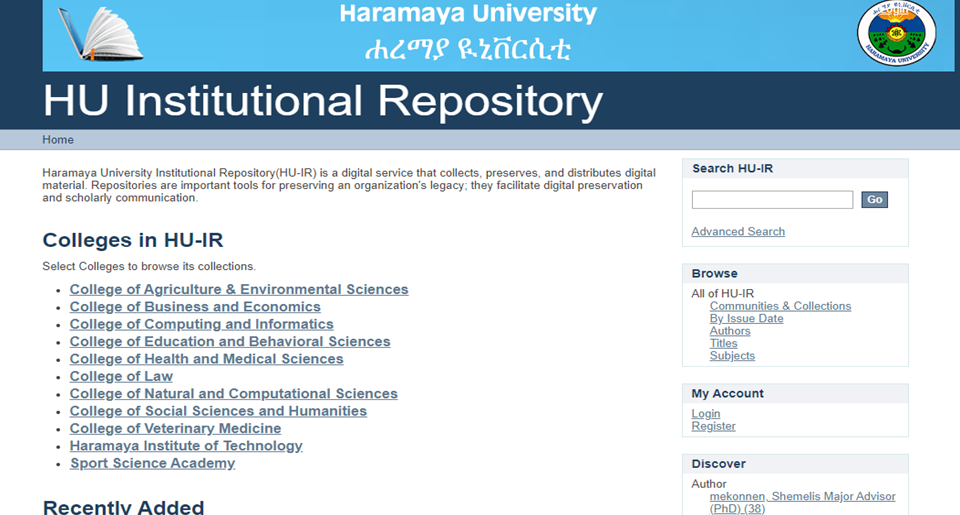
A Haramaya University institutional repository is an archive for collecting, preserving, and disseminating digital copies of the Theses and Dissertations of the University.
Please visit our digital notice board or digital librarian department at the main library to get an access IP address.
Online Public Access Catalog Services: Access url Address (http://hulirs.haramaya.edu.et)
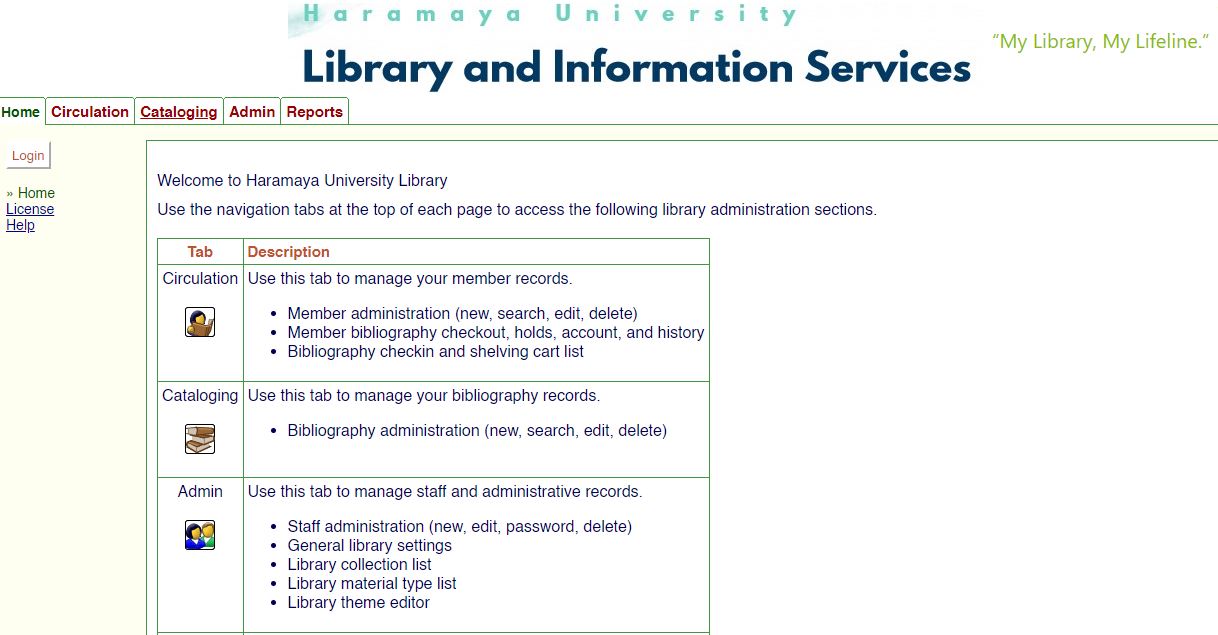
Our OPAC is an online database of all the resources and materials available in our libraries.
In our Online public access catalogs, we potentially replace the old-fashioned card catalog as a means of helping our users locate the resources they seek. Users are able to search the database electronically, which can provide them with a quicker and more thorough means of locating necessary information, resources, books, literature, or other materials in the library.
Digital Archival Management System
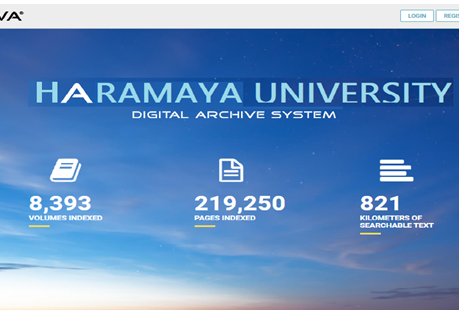
Nainua software is the archival software we are using. This software is designed with the best security or legal requirements. Currently, we digitize more near to 1000 collections.
"We Work with Several organizations from different industries with various needs"
Our digital archiving software is integrated with Treventus ScanRobot and ScanGate software which simplifies the digitization process.
Now we are scanning and archiving our physical collections with this software.
Haramaya University Museum Collections Management system

HrU Museum Management System: Access url Address (http://museum.haramaya.edu.et)
We are making our university museum collections more visible and accessible than ever before.
Flexible and purpose-built for museums and galleries, Argus enhances curation and opens your museum’s doors to the world.
Library Digitization
Haramaya university library & Information Services is increasingly becoming digital conscious. We launch a digitization project called “HU-LIB-DIG” designed to digitize our University archival collections in response to the global information exchange and for wide outreach.
The project will offer a solution for the loss of documents especially in health records, human resource documents, legal documents, letters and other strategic documents. It is also a way of preserving aging materials that could have otherwise gone into extinction. It further signifies the university hidden historical events and communications. When digitized materials are put on the web, they tend to increase the university’s visibility as the users all over the world access the materials. The library has integrated digitization machines and Digital archival software
Digitization Technologies We have... ScanGate
ScanGate

We are using the most powerful stand-alone workstation/desktop software provided by Treventus for image processing & automation. The ScanGate software is easy to use and highly automated workflows.
ScanGate is good for better archiving, quality image for presentation, and optimal quality for printing
NAINUWA

Nainuwa is an Archival software that we are using to archive our digitized contents. it has a very interesting feature of searching and browsing digitized content as never before.
ScanRobot

Thanks to Treventus ScanRobot, we are digitizing our collections with better performance than ever before.
See more: Treventus
Training Service
Information Literacy skills training
What is Information Literacy?
"Information literacy is knowing when and why you need information, where to find it, and how to evaluate, use and communicate it in an ethical manner"
(CILIP, 2004)
Why are information skills so important?
With information available in many formats, and of varying quality, it is essential that students have the skills to enable them to exploit the wide range of information resources available and to retrieve, evaluate and use that information effectively.
By empowering students to develop these skills, we can contribute to their academic success and help ensure that our graduates become independent and successful lifelong learners.
Information Literacy Framework at Haramaya University
The HrULIS has produced a 3-level information literacy framework to assist the development of its IL programs. For each level of the framework, an indicative set of learning outcomes has been developed, which includes relevant assessment and evaluation techniques. As the students advance through their academic programs, this framework will enable them to progressively build their skills. The framework will also facilitate collaboration with academic departments and help integrate IL skills into the curriculum.
How we can help you to develop your information skills
The Haramaya University Library and Information Services offer a range of information skills sessions to every postgraduate student in each program in the university. We believe subject librarians must work in close partnership with teaching staff to develop, design and deliver information literacy skills programs across each discipline.
Information skills sessions are available throughout the year and can be booked by students and staff by contacting the Information Literacy Team; please make a booking online or, contact us by hrulis2021@gmail.com, by phoning the library (+251255530326), or by making inquiries at the library desk.
By developing information literacy skills students will be able to:
-
Understand the need to use the information and define your research topic
-
Identify the range of information resources available
-
Locate and access information using different library collections
-
Use search tools to locate relevant information by applying effective search strategies
-
Identify and use subject-specific library databases
-
Use information independently and critically
-
Locate and evaluate quality information on the web
-
Cite information and use it in a responsible and ethical manner
